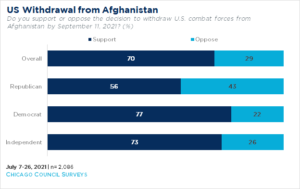From “Where America Lost and Gaines Population Could Throw Democrats a Redistricting Lifeline” by Nathaniel Rakich at FiveThirtyEight:
With the release of block-level data from the 2020 census, we now have a much clearer picture of how and where the U.S. population has grown — and shrunk — over the past 10 years. And while Republicans are largely setting the terms of the redistricting process that will ensue from this announcement, the data throws a much-needed lifeline to Democrats.
It’s not because of the country’s increasing racial diversity, though. Sure, under current electoral coalitions (where white voters are more likely to vote Republican and voters of color are more likely to vote Democratic), it’s arguably better for Democrats if the nonwhite population grows. But even in a country where only 58 percent of residents are non-Hispanic white, the 2020 presidential election was still very competitive. And electoral coalitions can change — for instance, Republicans may continue to gain groundamong nonwhite voters in future elections.
Instead, the good news for Democrats came in which parts of the country gained and lost population since the 2010 census. Despite the country’s overall population increasing by 7.4 percent, rural areas — the reddest parts of the country — have steadily lost residents over the past 10 years. The average county with a FiveThirtyEight urbanization index below 81 lost 3.1 percent of its population between 2010 and 2020. This encompasses the 1,430 most rural counties in America — 1,302 of which voted for former President Donald Trump in 2020, and only 127 of which voted for President Biden.
By contrast, the fastest-growing parts of the country are the suburbs. The average county with an urbanization index between 11 and 13 (spanning from sparse suburban areas like Roanoke County, Virginia, to dense suburban areas like Union County, New Jersey) grew by 9.6 percent between 2010 and 2020. Most of these counties (194 out of 264) voted for Biden, and if the trends of the 2018 and 2020 elections continue, they will only get bluer.
America’s cities grew at a healthy rate too, which was something of a surprise compared with pre-census estimates. The 18 most urban counties or county equivalents in the country — those with a FiveThirtyEight urbanization index above 13 (including San Francisco, Philadelphia, four around Washington, D.C., and eight around New York City) — grew by an average of 8.4 percent — and all but one of them voted for Biden in 2020.2
Overall, the average county that voted for Biden boosted its population by 3.4 percent between 2010 and 2020, while the average Trump county grew by just 0.2 percent. Strikingly, 370 out of the 538 Biden counties (69 percent) gained population, while 1,468 out of the 2,574 Trump counties (57 percent) lost residents.These population shifts are important because they will shape the nation’s political geography for the next 10 years, as congressional district lines will be drawn based on this data. As such, it will now be that much harder to draw congressional maps that favor Republicans: If a heavily Democratic metropolitan area is overflowing with people, map-drawers need to put them somewhere — which may necessitate creating an extra (blue) district for that city, or at least including more blue precincts in a neighboring Republican district than the GOP would like.
Democrats are still in trouble regarding next year’s midterm elections. But the longer term picture looks a bit brighter — if Dems can come back strong in 2024. As Rakich concludes, “So Democrats got some good news with the specific census data released earlier this month, but they are still in an unenviable position. As long as redistricting remains such a subjective process, who draws the maps will remain more important than the underlying data.”




